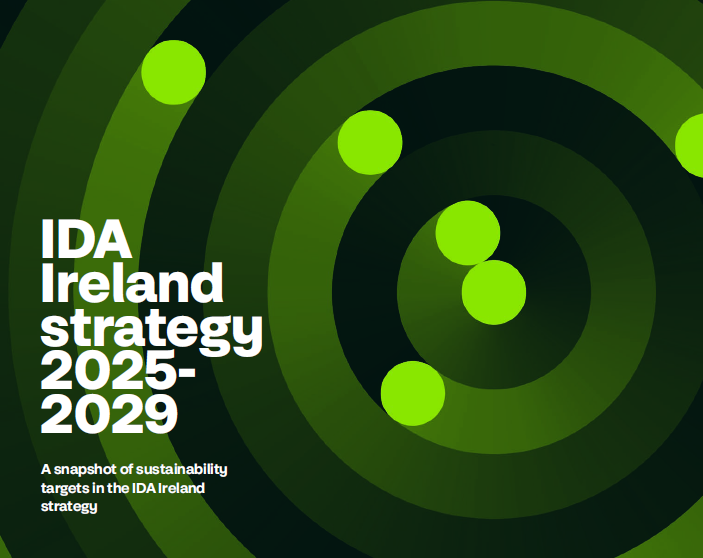
Prescribing progress
Like many industries, the life sciences sector is adapting: to serve the needs of changing demographics as populations age; to respond quickly to health events like pandemics; and to embrace technology in researching new breakthroughs, in optimising manufacturing processes, or embedding tech onto the devices themselves.The combination of digital technology with healthcare creates enormous potential for innovation in products and services. This development presents a superb opportunity for Ireland to continue forging its path at the forefront of life sciences. It is why IDA Ireland chose health as one of the four key pillars of our strategy for 2025-2029.
I believe Ireland occupies a unique position to drive innovation in life sciences, by enabling the collaboration needed to make new digitally enabled products and services a reality.
We have 100,000 people directly employed in life sciences throughout Ireland across the various disciplines of pharmaceuticals, biopharma and medical technologies. Allied to that, we have an incredibly strong technology base that includes complex, highly digitised technology and manufacturing-based industries, cloud computing companies, specialist cybersecurity businesses and software engineering operations.
Few locations in the world host 14 of the top 15 medical technology companies and 13 of the top 15 pharma/biopharma companies adjacent to 16 of the top 20 global technology companies. We are already seeing a convergence between these disciplines, with leading medtech and pharma companies recruiting specialists in data analytics and AI. That’s no accident: in Ireland, we have been steadily building this capability, with research centres such as ADAPT and Insight that have been working in this field for decades. Ireland was one of the first countries in the world to develop an industry-driven nationwide Postgraduate MSc in Artificial Intelligence; it also has one of the highest number of EurAI fellows per capita.
There has also been increasing activity in fintech and global insurers based in Ireland using advanced data science and analytics, while recent significant investments in AI by Microsoft and IBM endorse the progress made to date, and show confidence in what’s next.
What’s more, Ireland’s size is its strength: all this expertise and knowledge is located across a small geographic area, which facilitates making connections. There are countless examples of our multinational base collaborating with research centres, and with domestic start-ups. Often, the two go hand in hand: Irish universities host innovation hubs like NovaUCD and BioInnovate Ireland that nurture early-stage companies.
National centres of excellence support the industry as it looks to the future. Digital Manufacturing Ireland enables Irish-based manufacturers to access, adopt and accelerate new digital technologies to stay competitive. The National Institute for Bioprocessing Research and Training (NIBRT) supports the biopharma sector in its biopharma manufacturing processes, and upskilling the people who work on it. NIBRT has become so renowned that it doesn’t just train people to work in Ireland’s bioprocessing sector: its global partner programme supports an international alliance of leading training and education organisations to meet the skills needs of the biopharma workforce.
Many IDA client companies also have dedicated life science innovation centres in Ireland. Stryker’s site at Anngrove in Cork is home to the worldwide headquarters of the AMagine Institute, its Centre of Excellence for additive technologies which advances new technologies from early R&D to support full commercial launch. On the biopharma side, MSD’s Dunboyne site includes a hub for research and manufacturing called BioNX, which supports new approaches to developing and launching MSD’s future biologics medicines.
All of this activity is nothing without talent, and in this respect, Ireland is well served. Our young population, with close to 50% under the age of 35, is an enormous asset. The pipeline and quality of STEM graduates ensures the talent pool at home continues to thrive, and we can augment this with a flexible work permit system for skilled workers who come from beyond the EU. This creates a welcome diversity of talent that contributes to enhancing the expertise of the workforce in Ireland.
With the talent and the technology expertise, Ireland is well placed to help the health and life sciences sector to adapt to, and innovate in, an exciting digital future.

Sector snapshot
Facts, figures and stories behind connected and smart health initiatives| Novartis and Deciphex collaborate on AI-enhanced pre-clinical studies Novartis Ireland and Deciphex, a Dublin-based digital pathology startup, are collaborating on AI-based approaches that improve the efficiency and accuracy of preclinical studies. Novartis is one of the world’s largest pharmaceutical companies, employing close to 108,000 people worldwide with approximately 900 in Ireland. At the time of the announcement, Caitriona Walsh, Country President, Novartis Ireland said: “We believe AI has transformative potential to accelerate the painstaking work of drug discovery and development. I look forward to seeing how our collaborative efforts can help us improve and streamline existing processes to deliver impactful medicines to patients more quickly.” Press release |
| Datavant world leader in secure healthcare data exchange chooses Ireland for global R&D hub In March 2025, Datavant announced its global R&D centre in Galway with plans to initially hire up to 125 people by the end of 2027. The Irish site will support Datavant’s global approach to product development and will operate as an integrated part of its tech and product development team. Datavant aims to make health data secure, accessible, and actionable by providing a privacy-compliant way to connect disparate patient-level datasets including electronic health records, claims data, lab results, clinical trial data, and more, helping healthcare organisations to unlock insights and opportunities that weren’t previously possible. It enables more than 60 million healthcare records to move organisations across the healthcare ecosystem: more than 80,000 hospitals and clinics, 75% of the 100 largest health systems, and 350+ data partners. Press release |
| Eli Lilly Eli Lilly has been in Ireland for close to 50 years. In 2024, the company unveiled a $1 billion expansion of its Limerick manufacturing site to increase production of biologic active ingredients for the company’s portfolio of treatments for Alzheimer’s disease. Lilly also invested $800 million to expand its Kinsale facility which makes diabetes and obesity medications. That site’s expansion includes a state-of-the-art project to help meet the demand for current and future treatments. The Kinsale facility uses a digital-first process that integrates continuous manufacturing technology to create a new manufacturing platform for creating complex peptides. It was recently recognised as the winner of the Innovation category in the International Society of Pharmaceutical Engineers’ prestigious “Facility of the Year” awards. Lilly has a longstanding commitment to sustainability. Once completed, the Limerick site will operate with 35% lower energy intensity, use 40% less water, and generate 15% less waste than traditional biopharmaceutical manufacturing processes. In Kinsale, Lilly has a 26-acre solar farm, one of the largest privately owned sites in the State, which powers a significant portion of the facility. Press release |
| Stryker Stryker has launched a Training Centre of Excellence at its facility in Tullagreen, Co. Cork. The three-year training initiative, developed with the support of IDA Ireland, will prepare the medtech company’s team for the future of work by fostering new skills, promoting innovative thinking, embedding a culture of continuous improvement, and advancing sustainability. The centre will feature a workforce transformation programme focused on upskilling and reskilling employees in every function of the business, with a focus on lean management and continuous improvement. Leaders at the facility will get tailored training to enhance their ability to develop high-performing teams. Digital and automation engineers will also train staff across the site on how to harness advanced technologies like AI for innovation and product development. |
| CLS Galway-based Complete Laboratory Solutions (CLS) is investing €9.9m to upskill its entire team over the next two years as it transitions to becoming a multinational company. Founded in 1994, CLS built up a proven track record in sample management, testing, validation, training and laboratory resourcing, becoming the highest accredited Irish-led contract laboratory. The training programme is intended to enhance CLS’s service offerings in quality assurance, regulatory affairs, training and consultancy, as it broadens its service portfolio into quality control, quality assurance, and associated training, regulatory affairs and resourcing. The company will also branch into new markets including semiconductors, engineering, and the green and coastal economy. The project is supported by the government through IDA Ireland. |
| iBio iBio is a highly innovative biotech-focused partnership between two major international companies with operations in the Mid-West, Eli Lilly and Analog Devices. They have teamed up with the University of Limerick to develop an immersive programme to nurture students into becoming leaders in the biotech space. Over the four-year course towards a Bachelor or Master of Science degree, students will spend half their time learning on campus and half in paid residencies in biotech industries. |
National Institute for Bioprocessing Research and Technology
Spotlight
A jewel in the crown of Ireland’s life sciences sector, the National Institute for Bioprocessing Research and Training (NIBRT), provides training and research to help the biopharma sector improve the process of manufacturing its medicines, and training the people who do so. It has become so renowned in the industry that it doesn’t just train people to work in Ireland’s bioprocessing sector: it works with international partners in many other parts of the world. NIBRT CEO Darrin Morrissey explains: “The training part of NIBRT’s operation trains people in the biomanufacturing standards of today and tomorrow; while our research works on exploring and developing potential biomanufacturing standards years from now.”
There are more than 100 multinational biopharmaceutical manufacturing facilities in Ireland, with 23 of them manufacturing biologic therapies, and NIBRT has a relationship with them all. Since its inception in 2007, the centre has trained nearly 50,000 people who work in the industry. It also has links to all of Ireland’s higher educational institutes and is linking into hospitals which play an important role in developing advanced therapies.
As treatments become more personalised, the manufacturing process becomes more complex, and the need for optimising it increases. “The more you can use technology and data-based science to improve your manufacturing process, the more you improve the manufacture of advanced therapies,” adds Morrissey.
In 2024, NIBRT announced a €21 million investment in a new 1,800m2 advanced therapies facility, including seven research labs and state-of-the-art training suite. It’s envisaged the new site will enhance Ireland’s position in biopharma manufacturing. The biopharma sector now directly employs ca. 50,000 people, which has more than doubled since 2014.
Digital Manufacturing Ireland
Spotlight
Digital Manufacturing Ireland is an industry-led organisation that enables Irish-based manufacturers to access, adopt and accelerate new digital technologies to solve real-world challenges and enhance their competitiveness. Its approach is grounded in practical applications that industries can apply today to improve their manufacturing processes. DMI’s digital factory facility, at the National Technology Park in Limerick, showcases new technologies in an industrial setting, and draws on the experience of senior industry leaders with knowledge of adopting these advanced techniques and technologies inside a manufacturing environment.
One of DMI’s working groups is focused on visual cognitive manufacturing, which has a diverse mix of organisations working together to develop next-generation machine vision technology that allows industrial equipment to ‘see’ what it’s producing.
The group gathers manufacturing companies, academic institutes, technology companies and specialist vendors. In 2025, DMI unveiled the Vision Accelerator at its Limerick site: a cutting-edge facility equipped with the latest advancements in machine vision from innovators and global technology leaders. Open to manufacturers and machine builders globally, the Vision Accelerator includes:
- A comprehensive technology exemplar area showcasing a range of machine vision solutions
- Digital microscopes, smart vision sensors, and AI-driven vision systems
- Advanced optics, lighting, and vision-guided robotics for assembly.

Health at the heart of IDA Ireland strategy 2025-2029
Health is one of the fourkey pillars of the IDA Ireland strategy 2025-2029.It identifies opportunities including: next-generation therapeutics, ‘smart’ medical technologies, digital and connected health, advanced manufacturing, and commercial services.
Disruption caused by the COVID-19 pandemic, aging populations, chronic disease management and economic and social challenges has placed significant pressure on global health and national healthcare systems. In tandem, we can see enormous potential for innovation in healthcare products and service delivery.
Ireland is a centre of global significance in the pharmaceuticals, biopharmaceuticals and food sector.
The portfolio is made up of small molecule pharmaceutical plants, and a rapidly growing number of large molecule manufacturing sites, deploying the latest technologies to accelerate and scale biologics drug production to meet global demand.
- Advanced therapies (e.g., cell & gene therapy) are developing as a growing opportunity area. Innovation across the sector is driving these advancements
- Global business services and technical operations activity is thriving; along with the strong base of FDI in the food sub-sector, with a range of manufacturing and services related activities from major global food and beverage companies.
- Ireland is internationally recognised as a global centre of excellence in the Medical Technologies sector. Ireland is home to one of the world’s largest medtech clusters outside the USA
- The sector is evolving rapidly through continuous innovation, adopting new digital manufacturing technologies, which drive significant productivity gains, competitiveness, and agility within global supply chains
- Devices are becoming smarter with the integration of sensors and data, enabling remote patient monitoring and better data gathering and insights to enhance innovation and patient care.
- Next-generation therapies
- ‘Smart’ medical technologies
- Digital and connected health
- Accelerated drug development
- Advanced manufacturing, and commercial services

What they say
| 'This extensive base of pharmaceutical, biopharmaceutical and medical technology companies and its proven capacity to innovate, means Ireland is poised to capitalise on opportunities where life sciences intersects with other era-defining trends.' IDA Ireland Strategy 2025-2029 ‘Adapt Intelligently’ |
| 'Ireland’s healthcare expertise in research and production has become top-notch in the matter of 20-30 years. Companies like Dexcom and Medtronic are just two remarkable examples… IDA Ireland is a government agency that is needed by every country. Providing resources like infrastructure and funding for companies in Ireland and most importantly connecting the dots for entire industries. Overall I could see after 14 customer visits that Ireland is hungry for more and has proven to set up ecosystems that made them already one of the leading countries for healthcare and life science.' Lars Tinapp, AI Enthusiast Nvidia |
| 'This expansion strengthens our longstanding presence in Cork, where we have a highly skilled team, access to leading talent in the pharmaceutical industry, strong distribution links around the world and a great partnership with IDA Ireland. First doses from our new facility are expected by the end of 2027 and we are proud of the impact our site will continue to make for patients around the world.' Eugene Barrett, Site Leader and Managing Director GE HealthCare Ireland |
| 'Ireland is a leading hub for biopharmaceutical manufacturing and innovation for Europe and globally. By expanding manufacturing in Cork, we reinforce our in-region-for-region manufacturing and supply model, shortening lead times, reducing cross-border risks and giving customers reliable access to critical filtration technologies they need to deliver life-changing therapies.' Jean-Charles Wirth, CEO Merck Life Science |
|
'We’re delighted to see great progress across the various projects ongoing across the Astellas’ operational footprint here in Ireland. The continued investment by Astellas in Ireland will expand our capacity and capabilities for aseptic drug products, reinforce stable production for global supply, and accelerate the development and commercialisation of innovative antibody drugs and other new products. Astellas’ commitment to Ireland is a testament to the excellent record, past and present, of Astellas employees that have delivered for over 30 years across our Irish operations and the great relationship that Astellas has with the local community and local officials.' Lisa Murphy, General ManagerAstellas Pharma |
Summary
Helping the health and life sciences sector to innovate in IrelandAs a leading inward investment promotion agency, IDA Ireland offers a range of supports for companies in the medtech, pharmaceutical and biopharmaceutical sectors to continue investing in their Irish operations, including grants and tax credits towards research, development and innovation initiatives.
In addition, the Disruptive Technologies Innovation Fund (DTIF) is a €500 million fund in Ireland that supports the development and adoption of disruptive technologies by fostering collaboration between Ireland’s research community and industry. The fund is managed by the Department of Enterprise, Trade and Employment (DETE) and administered by IDA Ireland’s sister agency Enterprise Ireland. Health-related projects have been the single largest recipient of funding since the DTIF was set up in 2018.
Among the initiatives backed by the fund are:
- AI to target accurate screening which will contribute to improved outcomes for cancer patients
- a cell therapy platform for potential use in conditions like neonatal brain injury, cerebral palsy and adult neurodegenerative diseases
- an inhaled bioengineered exosome therapeutics for the treatment of Chronic Obstructive Pulmonary Disease (COPD)
- Treatment for chronic migraines
- Health-based smart wearables
- Regenerative treatment for knee osteoarthritis
